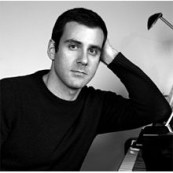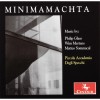Composers
Matteo Sommacal, born 18 November 1977 in Roma (Italy), is an Italian composer and mathematical physicist.
As a composer, he has been active since 2000 writing concert and film music. Since late 2000, he has been serving as the artistic director of the Italian chamber ensemble Piccola Accademia degli Specchi, that premiered and recorded several of his compositions.[1] As a scientist, his main research is in the field of nonlinear evolution equations and in studies dealing with the onset of chaotic behaviors in dynamical systems. He is currently Senior Lecturer in Applied Mathematics at Northumbria University.
He was introduced as a child to ancient music and recorder which later on inspired him to pursue extensive research of Renaissance and Baroque repertoire, through the guidance of Gabriella Casularo, Marcos Volonterio (Conservatoire Populaire de Musique, Geneve, CH), John Tyson (New England Conservatory of Music, Boston, USA) and Stefano Bragetti (Conservatorio della Svizzera Italiana, Lugano, CH). After a brief period performing recorder,[2] in 1997 he met Carmelo Piccolo, professor at the Conservatorio Statale di Musica "Gioachino Rossini". This meeting was a turning point for his musical career: through Piccolo, he discovered the freedom and beauty of the language of modern music and began focussing his studies in composition and piano. A mathematician as well, he was ultimately attracted to the disciplined,[3] highly structured and near scientific treatment of the musical material typical of many minimalist and postminimalist composers. In late 2000, with a group of young musicians devoted to contemporary music, he co-founded in Rome the ensemble Piccola Accademia degli Specchi, as a laboratory to realize his and other living composers' musical experimentation.
His works are regularly performed in Italy and major festivals dedicated to contemporary music. In September 2004, his work Quasi un tango per la neve del mattino, for soprano sax, cello and piano four-hands, was premiered at the "Festival delle Città/Estate Musicale" in Portogruaro (Venice), Italy, with Alessandro Specchi at the piano.[4] His work Emersioni, for percussion ensemble and organ, was premiered in 2005 by the Gruppo Percussioni Trieste conducted by Fabian Perez Tedesco at the season opener of the Conservatorio di Musica "Giuseppe Tartini" in Trieste, Italy.[5] His music was performed at the Contemporary Music Festival "Luigi Nono" in Trieste, Italy, in 2004 by the Piccola Accademia degli Specchi,[6][7] and in 2005 by the Corale Nuovo Accordo, conducted by Andrea Mistaro.[8] He participated in three programs of the International Contemporary Arts Festival "Postaja Topolove" (July 2004,[9] July 2005,[10] July 2006[11]). His music was performed at "Cantiere Musica" (July 2008),[12] "The September Concert" (September 2009)[13][14] and "Nuovi Spazi Musicali" (October 2009),[15] under the artistic direction of Ada Gentile, where Piccola Accademia degli Specchi premiered his work La ragazza che dormiva sotto il letto.[16]
In 2009, the festival "Bagliori d'autore" commissioned him to compose a work based on the life and writings of Victor Hugo: for this commission he wrote a piece for speaker and ensemble entitled Actes et paroles, with a text elaborated by Chiara Piola Caselli after Victor Hugo's last political speech, "Sur la Revision de la Constitution", given on 18 July 1851. The piece was premiered in Rome in November 2009 by Piccola Accademia degli Specchi featuring the composer Matthias Kadar.[17]
In addition to live performances of his music, his compositions have been featured on radio such as New Sounds on WNYC[18][19] and Echoes[20] on NPR.
His two works for chamber ensemble Counter Rotating In Vacuum and Le Ragioni Dimenticate were defined as "particularly enchanting" by the music critic Rob Haskins on the May/June issue of the American Record Guide.[21] Reviewing his piano multi-hand suite Fibonacci's Piranhas, the Italian pianist and video-music artist Valeria Di Matteo wrote that it represents "a perfect example of how, in the context of minimal music, the two languages of music and science can balance and cooperate for the achievement of works of high artistic value".[22]
He scored several documentaries and experimental short films, notably the musical short Candidamente by Ruggero Lancia (Italy 2000); the historical documentary La Resistenza nella Provincia di Roma by Michele Imperio (Italy 2006),[23] which received the sponsorship of the Province of Rome; the documentary Macchia Madre by Simona Marziani (Italy, 2008); and the documentary A Mani Nude by Piero Pieri (Italy 2010), produced by the national broadcasting service RAI. He also scored the current European Marine Equipment Council promo video (Belgium, 2008).[
Refine by search
view all| Country: | Italy |
| Period: | Minimalism |
Biography
Matteo Sommacal, born 18 November 1977 in Roma (Italy), is an Italian composer and mathematical physicist.
As a composer, he has been active since 2000 writing concert and film music. Since late 2000, he has been serving as the artistic director of the Italian chamber ensemble Piccola Accademia degli Specchi, that premiered and recorded several of his compositions.[1] As a scientist, his main research is in the field of nonlinear evolution equations and in studies dealing with the onset of chaotic behaviors in dynamical systems. He is currently Senior Lecturer in Applied Mathematics at Northumbria University.
He was introduced as a child to ancient music and recorder which later on inspired him to pursue extensive research of Renaissance and Baroque repertoire, through the guidance of Gabriella Casularo, Marcos Volonterio (Conservatoire Populaire de Musique, Geneve, CH), John Tyson (New England Conservatory of Music, Boston, USA) and Stefano Bragetti (Conservatorio della Svizzera Italiana, Lugano, CH). After a brief period performing recorder,[2] in 1997 he met Carmelo Piccolo, professor at the Conservatorio Statale di Musica "Gioachino Rossini". This meeting was a turning point for his musical career: through Piccolo, he discovered the freedom and beauty of the language of modern music and began focussing his studies in composition and piano. A mathematician as well, he was ultimately attracted to the disciplined,[3] highly structured and near scientific treatment of the musical material typical of many minimalist and postminimalist composers. In late 2000, with a group of young musicians devoted to contemporary music, he co-founded in Rome the ensemble Piccola Accademia degli Specchi, as a laboratory to realize his and other living composers' musical experimentation.
His works are regularly performed in Italy and major festivals dedicated to contemporary music. In September 2004, his work Quasi un tango per la neve del mattino, for soprano sax, cello and piano four-hands, was premiered at the "Festival delle Città/Estate Musicale" in Portogruaro (Venice), Italy, with Alessandro Specchi at the piano.[4] His work Emersioni, for percussion ensemble and organ, was premiered in 2005 by the Gruppo Percussioni Trieste conducted by Fabian Perez Tedesco at the season opener of the Conservatorio di Musica "Giuseppe Tartini" in Trieste, Italy.[5] His music was performed at the Contemporary Music Festival "Luigi Nono" in Trieste, Italy, in 2004 by the Piccola Accademia degli Specchi,[6][7] and in 2005 by the Corale Nuovo Accordo, conducted by Andrea Mistaro.[8] He participated in three programs of the International Contemporary Arts Festival "Postaja Topolove" (July 2004,[9] July 2005,[10] July 2006[11]). His music was performed at "Cantiere Musica" (July 2008),[12] "The September Concert" (September 2009)[13][14] and "Nuovi Spazi Musicali" (October 2009),[15] under the artistic direction of Ada Gentile, where Piccola Accademia degli Specchi premiered his work La ragazza che dormiva sotto il letto.[16]
In 2009, the festival "Bagliori d'autore" commissioned him to compose a work based on the life and writings of Victor Hugo: for this commission he wrote a piece for speaker and ensemble entitled Actes et paroles, with a text elaborated by Chiara Piola Caselli after Victor Hugo's last political speech, "Sur la Revision de la Constitution", given on 18 July 1851. The piece was premiered in Rome in November 2009 by Piccola Accademia degli Specchi featuring the composer Matthias Kadar.[17]
In addition to live performances of his music, his compositions have been featured on radio such as New Sounds on WNYC[18][19] and Echoes[20] on NPR.
His two works for chamber ensemble Counter Rotating In Vacuum and Le Ragioni Dimenticate were defined as "particularly enchanting" by the music critic Rob Haskins on the May/June issue of the American Record Guide.[21] Reviewing his piano multi-hand suite Fibonacci's Piranhas, the Italian pianist and video-music artist Valeria Di Matteo wrote that it represents "a perfect example of how, in the context of minimal music, the two languages of music and science can balance and cooperate for the achievement of works of high artistic value".[22]
He scored several documentaries and experimental short films, notably the musical short Candidamente by Ruggero Lancia (Italy 2000); the historical documentary La Resistenza nella Provincia di Roma by Michele Imperio (Italy 2006),[23] which received the sponsorship of the Province of Rome; the documentary Macchia Madre by Simona Marziani (Italy, 2008); and the documentary A Mani Nude by Piero Pieri (Italy 2010), produced by the national broadcasting service RAI. He also scored the current European Marine Equipment Council promo video (Belgium, 2008).[



